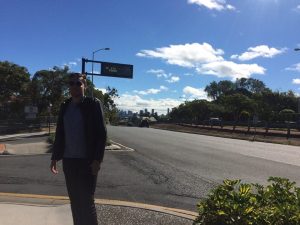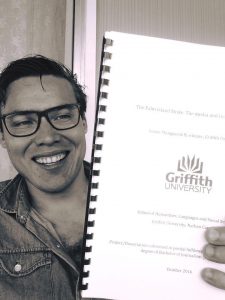Af Simon Thinggaard Hjortkjær (journalist)
A different approach to journalism
Reading about WORLDREP in 2015, I was immediately onboard with the program. I had always known that I would do what I could to go out as an exchange student. I remember my very first day at the Danish School of Media and Journalism. We, the new students, were told to come up with questions about the school and figure out who to talk to in order to get answers. The only question on my mind was ‘How can I get out of here?’. On exchange, I meant of course.
When it became time to apply for exchange, WORLDREP stood out to me as a clear priority. There were a few initial key factors, which really sold it to me:
- I could go to an English-speaking country
- I could go to a part of the world that I find interesting
- I could get the opportunity to experience a more academical approach to journalism
But most importantly, WORLDREP offered two semesters of exchange as opposed to the standard single semester. It was, and remains, my opinion, that a longer stay equals a better educational outcome as well as a deeper cultural and social immersion, no matter the destination.
 If you are reading this and are not familiar with the Danish School of Media and Journalism, I should probably explain what I mean with ‘different approach to journalism’ at this point: The Danish School of Media and Journalism is a highly specialised school, and not a university like the other schools in the WORLDREP program. The Danish School of Media and Journalism takes a very practical approach to teaching journalism, with three out of eight semesters being fully-paid internship and practical journalism in almost every course. Graduating from the school, an alumni will have close to two years worth of practical experience under his/her belt. As such, I was happy to get the opportunity to experience a more theoretical side to journalism. I should also say that I think students from other universities can benefit from experiencing the practical approach of the Danish School of Media and Journalism, making WORLDREP a great concept.
If you are reading this and are not familiar with the Danish School of Media and Journalism, I should probably explain what I mean with ‘different approach to journalism’ at this point: The Danish School of Media and Journalism is a highly specialised school, and not a university like the other schools in the WORLDREP program. The Danish School of Media and Journalism takes a very practical approach to teaching journalism, with three out of eight semesters being fully-paid internship and practical journalism in almost every course. Graduating from the school, an alumni will have close to two years worth of practical experience under his/her belt. As such, I was happy to get the opportunity to experience a more theoretical side to journalism. I should also say that I think students from other universities can benefit from experiencing the practical approach of the Danish School of Media and Journalism, making WORLDREP a great concept.
Naturally, I was extremely happy to be picked for the WORLDREP program.
The other DMJX (Danish School of Media and Journalism) student who was picked to go to Griffith University was Kasper, one of my friends from school. Going on exchange with someone that I knew in advance did of course offer some upsides. For example, Kasper and I rented a unit together, bought a car together and shared other expenses as well. Besides the economical aspect, we were able to provide support to each other, since Kasper and I shared the same experiences.
During the first semester, I was introduced to other journalism students, including some of the Griffith students who later went to the Danish School of Media and Journalism in the WORLDREP program. In one of our courses, we covered the Australian election with these students. For obvious reasons, this will not be part of the course for exchange students every year, but covering the election was a brilliant opportunity for me to gain a better understanding of Australian politics, the political system and hot political topics in a part of the world so far from home.
 In the first semester, most days were spent on campus. I had courses with other Honours students in different fields (mostly sociology). Meeting them provided valuable insight into other fields of study and different methodologies. In other classrooms, I spent time with local journalism students, which provided a great opportunity to discuss various aspects of journalism, including ethics, media ownership and so on.
In the first semester, most days were spent on campus. I had courses with other Honours students in different fields (mostly sociology). Meeting them provided valuable insight into other fields of study and different methodologies. In other classrooms, I spent time with local journalism students, which provided a great opportunity to discuss various aspects of journalism, including ethics, media ownership and so on.
Whilst most of the first semester was spent on campus, the second semester was mostly dedicated to writing my Honours thesis. As mentioned earlier, I was used to a very different approach to journalism education, but I had a very helpful supervisor, who guided me safely through the process and helped me achieve a great result in the end. My Honours project, I should mention, investigates the treatment of Australia’s Indigenous people in mainstream media.
Between the semesters, I had plenty of free time to travel Australia and get to know the local area better. I think that is an important part of going away on exchange – not much point to it if you do not get the opportunity to explore where you are. Kasper and I took our car and drove south to Sydney and Melbourne and took the ferry to Tasmania to visit another Danish WORLDREP student in Hobarth.
I would recommend WORLDREP to anyone interested in widening their understanding of journalism and/or politics. As I have highlighted here, WORLDREP also offers an opportunity to experience a different approach (more practical/more theoretical) to journalism.
Specifically, I would like to recommend Griffith University. Brisbane is an amazing city, possibly my favourite city in the world now. I liked it from the very beginning, and only grew more and more fond of it as the year went on. The staff at Griffith University is very helpful and friendly. Students in the WORLDREP program will have plenty of opportunities to explore Australia and there are many activities outside of school to get involved with as well.
I hope to return to Brisbane, and possibly to Griffith University, someday.